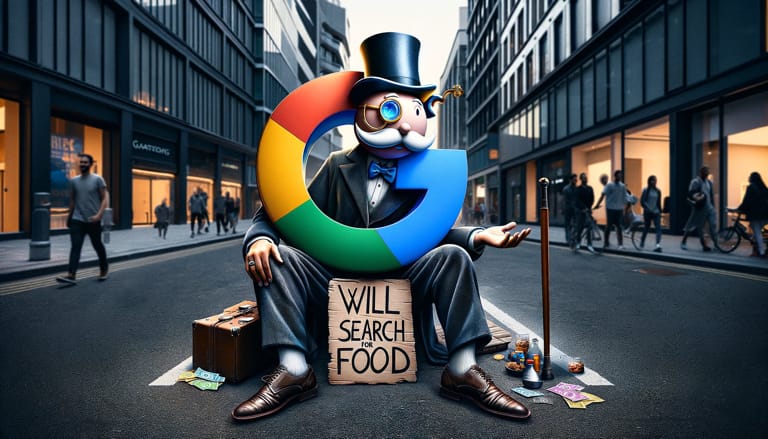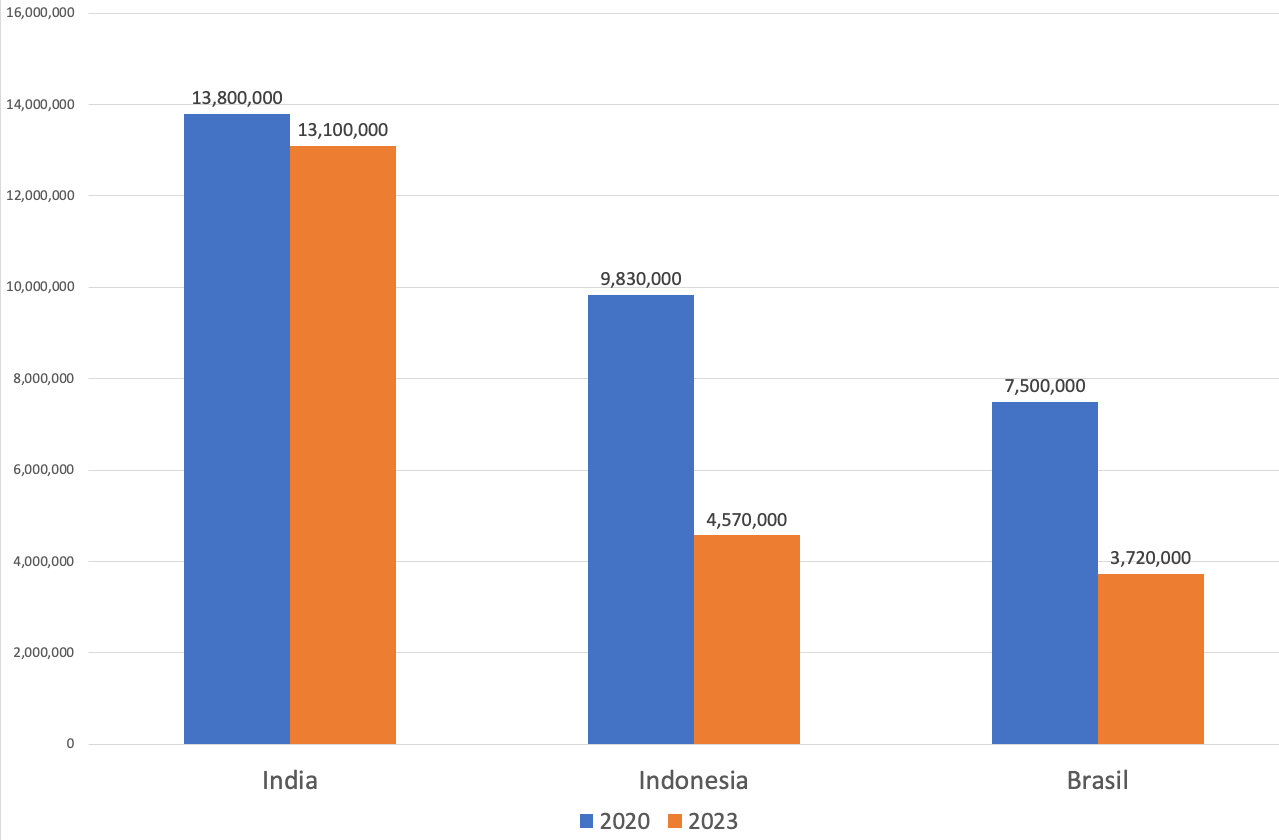GBP Sites Going, Google Guarantee Scam Impact, AI & the Future of Search

Google Business Profile Websites Bite the Dust

Earlier this week Google announced that as of March 1, Google Business Profile (GBP) Websites would be shut off and redirected to the Business Profile itself. As of June 10, they will "show as unavailable." GBP Websites, first released publicly in June of 2017, passed 36 million sites worldwide and continued on a strong upward trend into early 2020. When released, the product was targeted to the "next billion users" with a heavy focus on India, Indonesia and Brazil. It was a solid "V1" when introduced. I noted in 2017 that it allowed "a small business operator to produce an attractive mobile ready site in 5 minutes. And it is well suited to a first time website for a business with no or very little web presence." It was well integrated into Google Domains and made domain acquisition very easy for the SMB. It was a natural upsell. Unlike many V1 Google products, this product worked well out of the chute and fit into a growing suite of SMB products that Google was developing at the time, including Posts and Messaging. By 2020 India, Indonesia and Brazil comprised 31 million of the 36 million (85%) websites created. With the 2022 rollout of GBP web-based (NMX) interface, the ability to edit or create these websites was hidden in the interface clearly foreshadowing the product's demise. The sale of Google Domains to Squarespace in 2023 seemed to seal the deal. Today, GBP Websites in these countries have declined substantially. Like many other Google products, despite widespread uptake, it saw no development over the years. Initially, it saw promotion in the targeted markets but soon that waned as well – and another Google product joins the overcrowded graveyard.

Our take:
- GBP Websites was an innovative, well targeted product that never left V1 in its seven years of existence.
- Like many Google products, it failed from what seems to be intentional neglect. The product's huge potential remained underdeveloped.
- In 2017, I noted that "for a business to build a strategic asset like a website takes faith in Google that I am not sure that they have earned." It has become crystal clear over the years that a business should "own" their digital assets and not rely on Google for business-critical tools and tasks.
How the LSA Scam Affects Local Businesses

If you lived in the White House and were searching for duct cleaning, you'd likely see a fake listing using fake reviews (from public attractions) and a stolen business license that looked "ideal" but was setting you up for bait-and-switch on the sales side. Recently, we started to see these scammers steal reviews from real businesses in related service industries so the listings appear even more convincing to consumers who do read reviews. In the example above EXPERT Air Duct Cleaning, working out of the Virginia and the Washington, DC area, stole reviews from a Stanley Steemer location in Palatine, IL. Stanley Steemer is not the first honest business impacted by this scam and probably won't be the last. But these fraudulent ads, enabled by the Google Guarantee, unjustly undercut honest businesses. To better understand their impact, I interviewed several home services business owners and marketers over the past week. An owner in the carpet cleaning industry in the UK noted an income decline of 60-70% and a new willingness to "fight fire with fire," i.e., buying fake reviews to compete. I also spoke with an Israeli owner of an HVAC business in South Central Florida who described a WhatsApp network of ex-pats living in the US who regularly buy LSA listings with thousands of reviews for $1,500. They hire an answering service in Asia and set up a lead-gen business. When leads come in (often quoted at $99) they post them in the same WhatApp groups seeking workers to fulfill them. They then split the profits on the "upsell." These ex-pat workers often are without papers and have little or no community connection. They arrive in unmarked vans to "service" clients charging many multiples of the quoted price. Legit businesses lose customers to low-ball quotes, see their ad costs go up and lose a significant number of in-bound leads. If you are a business or agency working with Local Service Ads, this 13 minute interview with home services marketer Zachary Dotson details what businesses are up against and how the authorities and Google have been turning a blind eye.
Our take:
- Google has clearly known about this full-on illegal Google Guarantee scam since summer of 2023 and has done nothing to stop it. They have known about general LSA abuses for much longer than that.
- These scams create an unfair playing field where legitimate providers are forced to compete with bogus entities that don't follow the rules or bear the same costs, leading to a race to the very bottom for all LSA listings.
- Despite the clear violation of policies and laws, neither law enforcement nor Google seem interested in stopping these bad actors.
AI & the Future of Search
ChatGPT rolled out its GPT Store yesterday, essentially a marketplace of custom versions of ChatGPT focused on specific domains. For example, the AllTrails GPT enables you to ask for "trails that are mountain bike friendly, 10 to 30 miles in length, with easy to moderate mountain biking difficulty." In a parallel development, Rabbit introduced and quickly sold-out its 10,000 unit run for a $199 handheld AI device that uses an "LAM" (large action model) to get things done. With Microsoft and Google actively integrating generative AI across apps, Apple doing the same with both Siri and other apps, and every SaaS vendor doing it too, a very interesting question arises. What does the future of generative AI look like? Will users prefer a single-field interface (e.g., ChatGPT) with specialty apps installed? Or will we collectively gravitate toward apps powered by generative AI? And what hardware form factor will win out: a dedicated device (or wearable) or the smartphone already in your pocket? Equally interesting is the impact that this could have on Google. We've hit peak search and each of these AI developments raises the possibility of dinging, even if by a small amount, Google's search volume. The possibility of losing default search status on the iPhone could cost it another few points. To satisfy capital markets, Google's probable way forward is to wring more money out of its ad networks by manipulating auctions, creating new ad products like LSAs (even if fraught with criminality), lowering operating costs by laying off people and grabbing every share of the search pie with things like annoying interstitials.

Our take:
- It will take several years for all of the players to show their AI cards and for users to show their AI usage and integration preferences.
- Because of the nature of AI and hardware development, we think this battle is likely to be won by incumbents. If nothing else, things will get interesting.
- Regardless of the antitrust outcomes or perhaps because of them, Google will have to work much harder just to stay in place.
Recent Analysis
- Near Memo episode 140: Businesses & Google SGE, Google Goes All in On Interstitials, Where is Bard Going?
- ICYMI: Interview with Joy Hawkins & Darren Shaw: AI & Your Local SEO Agency, One Year Later.
Short Takes
- In the new Google Business Profile reinstatement/appeal process you have exactly 60 minutes to make your case, or else.
- Google Business Profile Agency Dashboard bug preventing adding new locations has been fixed.
- Local Service Ads defaults to appearing for your brand queries, but should be disabled.
- The EU decision that Google was using its dominant position to favor its own comparison shopping service will likely impact local search as well.
- When a service area business moves can they regain their rankings on Google Local at their new location?
Listen to our latest podcast.

How can we make this better? Email us with suggestions and recommendations.
